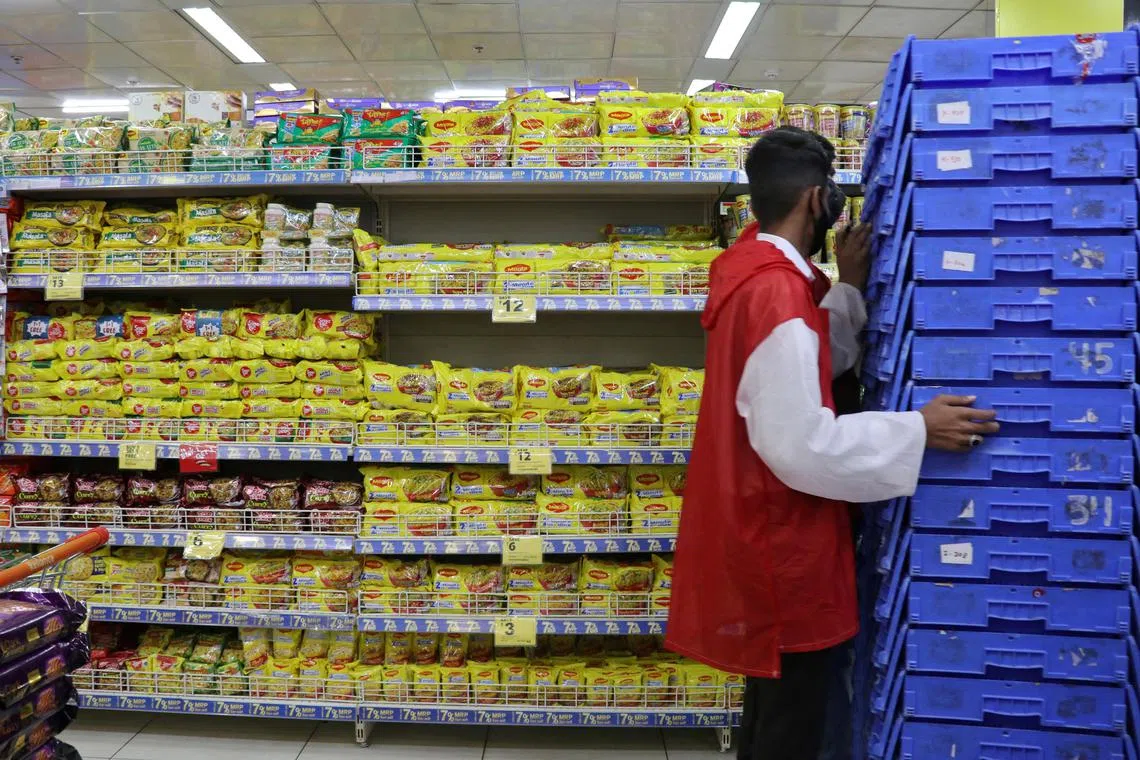Border strife triggers food hoarding, cancelled trips in India
Sign up now: Get insights on Asia's fast-moving developments

Some people have started stockpiling food and cancelled travel plans amid a rapid escalation in military conflict between India and Pakistan.
PHOTO: REUTERS
NEW DELHI – Many Indians, especially those living in areas closer to the Pakistan border, have started hoarding groceries, medicine and petrol and cancelling travel plans amid a rapid escalation in military conflict between the two nuclear-armed nations.
Citizens across towns in Punjab in India, such as Pathankot, Amritsar and Chandigarh, are seeing such panic buying.
Mr Gagandeep Madan, a 42-year-old who owns a “kirana” shop – a mom-and-pop store – about 14km short of the Attari-Wagah border near Amritsar in Punjab, said almost all shops in the area, including his, had run out of food essentials on May 7.
“Customers came and bought about one month’s worth of wheat, rice, sugar and pulses,” Mr Madan said. “Panic set in among everyone here. Everyone wanted to be prepared.”
India said it “neutralised” Pakistani drone and missile attacks targeting several military sites on the night of May 8, marking a second day of hostilities between the neighbours.
India began the military strikes on May 7 on what it called terrorist targets in Pakistan in retaliation for an April 22 attack that killed 26 civilians
With both nations saying they have shot down drones and missiles from the other in the past few days, local media reports say tourist hot spots are seeing dwindling footfall.
India has shut down more than two dozen airports in northern and western parts of the country.
Some residents in Amritsar stored water in large containers, fearing power outages would mean they cannot use their electric pumps to draw groundwater.
In Pathankot, Mr Ashish Kumar has been seeing a run on food products and snacks at his tiny kirana for the past few days.
The local administration of Chandigarh, the capital of the northern states of Punjab and Haryana, said in a post on social media platform X on May 9 that individuals and businesses were prohibited from hoarding essential commodities, medicine and fuel.
State refiner Indian Oil also sought to allay fears by saying it has ample stock of fuels and discouraged stockpiling.
“Our supply lines are running smoothly,” it said in an X post. “There is no need for panic buying – fuel and LPG (liquefied petroleum gas) are readily available at all our outlets. Help us serve you better by staying calm and avoiding unnecessary rush.”
Games disrupted
The Indian Premier League (IPL), the world’s most lucrative cricket tournament that was set to conclude on May 25, has now been suspended for at least a week.
The new schedule will be announced after assessing the situation, the sport’s governing body in India said in a statement on May 9.
An IPL match going on in the Himalayan city of Dharamshala on the night of May 8 was discontinued after reports of drone attacks in nearby cities.
A hotel in the nearby hill station of Dalhousie had to provide accommodation and transport to about 100 stranded guests who were visiting for the cricket matches, its 29-year-old owner Siddharth Bakaria told Bloomberg News.
His chain GoHolidays.in is expecting a drop in visitors to northern parts of the country.
Pakistan has also moved the remaining matches of its Pakistan Super League to the UAE for security reasons, Pakistan Cricket Board said in a statement.
The ongoing strife has also led to multiple events being postponed across Pakistan.
The EU Pakistan Business Forum in Islamabad, an investment summit in Lahore and Australia Day in Karachi all have been cancelled or delayed.
Karachi’s streets were quiet, with a drop in road traffic. One upscale Chinese restaurant hardly had any customers on the night of May 8, with the only television switched to a news channel.
Although Pakistan is not seeing a similar panic buying, sales of torchlights and batteries have gone up in the last couple of days, according to Mr Jarrar Shah, founder of 24Seven, which helps kirana stores go digital.
Instagram advice
Instagram users in India have started making and circulating videos online, advising the medicine that citizens should stock in case things worsen and instructing how to turn on government alerts on mobile phones in case of emergencies.
Some are giving financial advice, including keeping enough cash to last a few days and spreading funds across different banks to be safe.
“Right now, travellers should reconsider non-essential travel to certain domestic regions like Kashmir, parts of Jammu, Leh and Amritsar,” Mr Karan Agarwal, director at travel agency Cox & Kings, said in a statement.
“These areas are often the first to experience disruptions, both operational and security-related, when tensions escalate.”
Interglobe Aviation, which operates as IndiGo, has cancelled its flights to affected cities of Srinagar, Jammu, Amritsar, Leh, Chandigarh, Dharamshala, Bikaner, Jodhpur, Kishangarh and Rajkot, it said in an advisory on May 9.
IndiGo’s shares declined for the fourth straight trading session in Mumbai, losing almost 8 per cent since May 5’s close.
Shares of Indian Hotels – which operates the Taj brand of five-star hotels – have slipped a little over 10 per cent over this period.
Schools in Punjab are shut for the coming three days, the Education Minister of Punjab said in an X post on May 8.
Ms Meenakshi Chauhan, an Amritsar-based 38-year-old, is a mother of two who has already begun planning her evening routine around the city’s blackout timings.
“As everyone says, hope for the best but prepare for the worst,” Ms Chauhan said. BLOOMBERG


